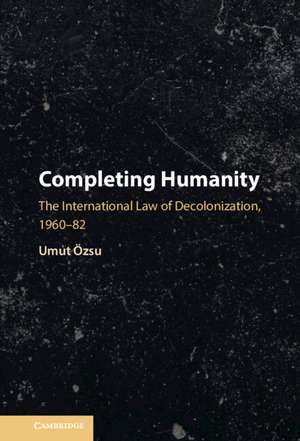Completing Humanity: The International Law of Decolonization, 1960–82
Autor Umut Özsuen Limba Engleză Hardback – 30 oct 2023
Preț: 662.42 lei
Preț vechi: 727.94 lei
-9% Nou
Puncte Express: 994
Preț estimativ în valută:
126.77€ • 137.65$ • 106.49£
126.77€ • 137.65$ • 106.49£
Carte disponibilă
Livrare economică 01-15 aprilie
Livrare express 18-22 martie pentru 37.18 lei
Preluare comenzi: 021 569.72.76
Specificații
ISBN-13: 9781108427692
ISBN-10: 1108427693
Pagini: 348
Dimensiuni: 237 x 159 x 26 mm
Greutate: 0.64 kg
Editura: Cambridge University Press
Colecția Cambridge University Press
Locul publicării:New York, United States
ISBN-10: 1108427693
Pagini: 348
Dimensiuni: 237 x 159 x 26 mm
Greutate: 0.64 kg
Editura: Cambridge University Press
Colecția Cambridge University Press
Locul publicării:New York, United States
Cuprins
Introduction; 1. Fixing Selves; 2. Forging Universals; 3. Redistributing Resources; 4. Pooling Rights; 5. Righting Markets; Conclusion; Bibliography; Index.
Recenzii
'In this study of the many initiatives of Third World states commencing in the 1960s, Özsu provides a vivid account of the personalities involved, the projects they inaugurated, and the battles fought over the meaning and direction of international law. What emerges is a masterly history of the 'international law of decolonization', a rich and valuable addition to the literature on a topic that is finally receiving the attention it deserves.' Tony Anghie, National University of Singapore
'In this history of the Third World's bid to transform international law, Özsu illustrates why the law was such an important arena for political struggle, tracks the expansive visions of an international legal order pioneered by lawyers from the global South, and makes clear how the struggles of the past remain with us in the present. Written with clarity and precision, Completing Humanity is an important contribution to the growing scholarship on decolonization.' Adom Getachew, University of Chicago
'In his stunning and unprecedented book, Umut Özsu describes the ambition and breadth of the decolonizing agenda — and why international law mattered so much to it – while probing the impasses, limits, and resistance that foiled it. An accessible and dramatic story, Completing Humanity is based on exemplary learning and overflowing with insight and provocation: the most significant and sophisticated contribution to the history of international law written in many years.' Samuel Moyn, Yale University
'This is a gripping new take on the relationship between the historical process of decolonization and international law. Özsu focuses on five key debates in international law which hold at their heart the struggle between those who seek to move beyond the tragic legacies of empire, and those who benefit from those legacies. The book offers a sustained engagement with a panoply of eminent and courageous jurists from the South, their allies, interlocutors, and rivals. The thoughtful alignment between orientation, method, and structure is a model for scholars of all stripes.' Sundhya Pahuja, University of Melbourne
'In this history of the Third World's bid to transform international law, Özsu illustrates why the law was such an important arena for political struggle, tracks the expansive visions of an international legal order pioneered by lawyers from the global South, and makes clear how the struggles of the past remain with us in the present. Written with clarity and precision, Completing Humanity is an important contribution to the growing scholarship on decolonization.' Adom Getachew, University of Chicago
'In his stunning and unprecedented book, Umut Özsu describes the ambition and breadth of the decolonizing agenda — and why international law mattered so much to it – while probing the impasses, limits, and resistance that foiled it. An accessible and dramatic story, Completing Humanity is based on exemplary learning and overflowing with insight and provocation: the most significant and sophisticated contribution to the history of international law written in many years.' Samuel Moyn, Yale University
'This is a gripping new take on the relationship between the historical process of decolonization and international law. Özsu focuses on five key debates in international law which hold at their heart the struggle between those who seek to move beyond the tragic legacies of empire, and those who benefit from those legacies. The book offers a sustained engagement with a panoply of eminent and courageous jurists from the South, their allies, interlocutors, and rivals. The thoughtful alignment between orientation, method, and structure is a model for scholars of all stripes.' Sundhya Pahuja, University of Melbourne
Notă biografică
Descriere
Examines the history of the rise and fall of the twentieth century's last major attempt to decolonize international law.
